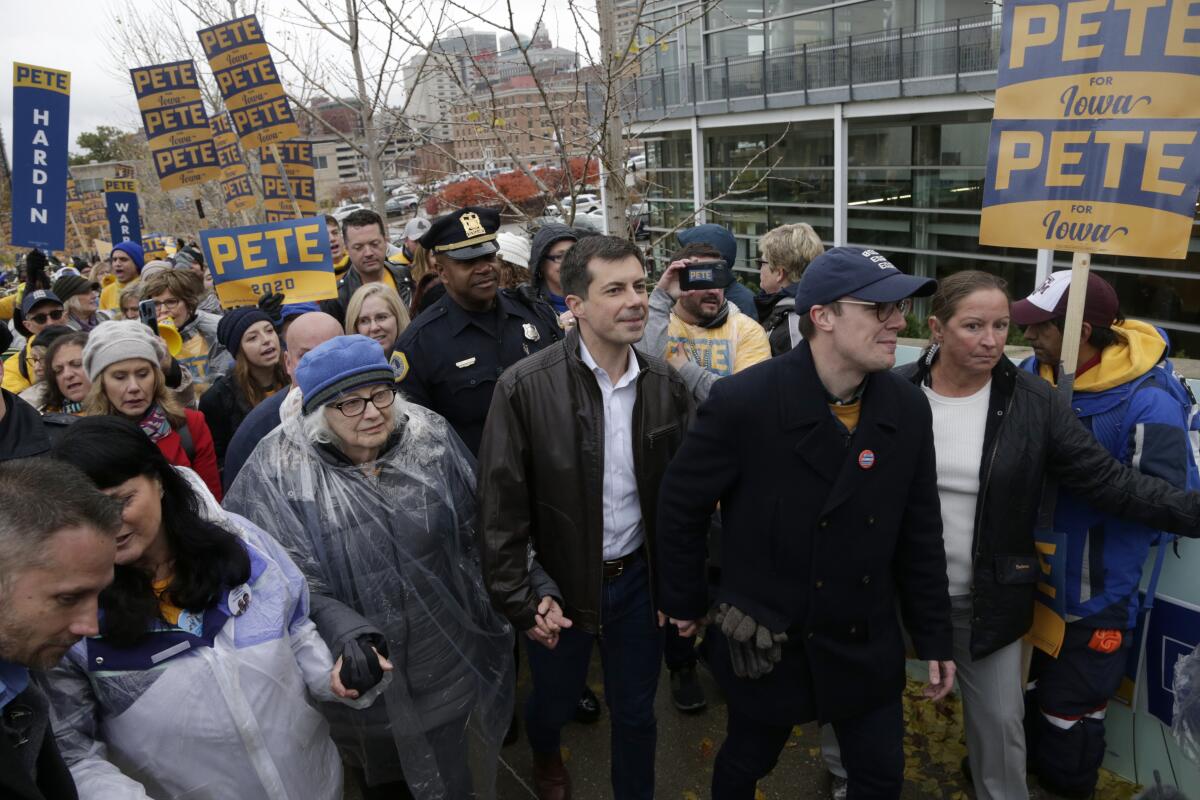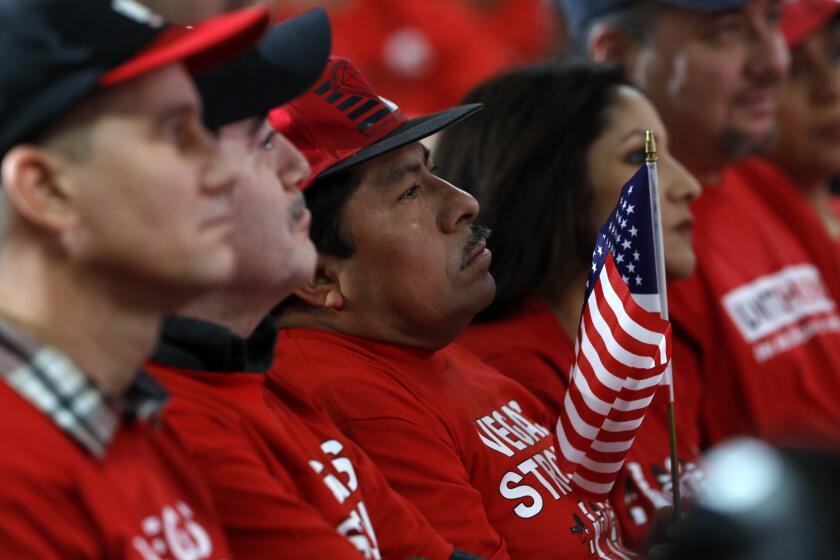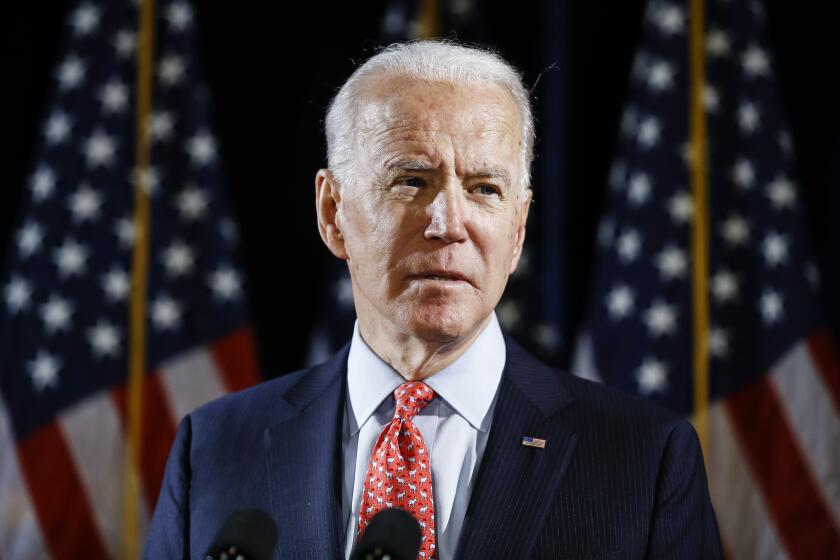Pete Buttigieg is missing support from another key Democratic group: Unions

- Share via
As Pete Buttigieg competes for a victory in the Iowa caucuses in two weeks and hopes to find support among voters of color, it turns out the former South Bend, Ind., mayor is also missing support from another key Democratic demographic: unions.
Buttigieg has embraced a policy platform that aggressively favors organized labor, but no unions so far have endorsed his bid to win the Democratic nomination for president. Labor groups instead have backed Sen. Bernie Sanders of Vermont, former Vice President Joe Biden or Sen. Elizabeth Warren of Massachusetts.
Over the last week, the 120,000-member International Assn. of Bridge, Structural, Ornamental and Reinforcing Iron Workers Union endorsed Biden, and the University Professional and Technical Employees union, which represents more than 16,000 University of California employees, endorsed Sanders, who has collected the most union endorsements thus far.
When the university union polled its members for the endorsement, Buttigieg received just 5% of the workers’ votes — fewer than outsider long-shot Andrew Yang, who got 7%.
“Pete is proud to run a strongly pro-labor campaign, and he’s put forward an agenda to empower workers, expand collective bargaining rights, and make it easier to organize a union,” Buttigieg spokesman Sean Savett said in a statement. “Unlike many of his competitors who have been on the national scene for decades, Pete is introducing himself to people across America, and he looks forward to earning the support of labor unions and union members on his path to the Democratic nomination.”
It’s still relatively early in the primary; many unions have yet to offer endorsements, and the labor movement is likely to back any Democrat who wins the nomination over President Trump, whose administration’s labor policies have consistently favored employers over unions. But no recent Democratic presidential candidate has won the party’s nomination without at least some support from labor groups, whose members will often organize for their union’s endorsees.
Buttigieg’s lack of support thus far is particularly notable in an election where unions’ popularity ratings are nearing their highest point in half a century, even as membership levels continue their decades-long stagnation.
Candidates, including Buttigieg, have courted the labor movement with sweeping policy platforms that would transform the American economy. They’ve visited picket lines and diligently honored union boycotts that have threatened to derail at least two televised debates. In a new trend, several candidates’ campaign staffs, including Buttigieg’s, have unionized.
“I think it’s mostly because he’s a newer guy,” said Sal Rosselli, the president of the 15,000-member National Union of Healthcare Workers, whose members co-endorsed Warren and Sanders. Buttigieg came in fourth place in the union’s rank-and-file balloting process.
For candidates like Sanders, “we’ve known him since he was in ... the House,” Rosselli said. “There’s just that history and relationships that unions have with some of these elected leaders.” The union also backs a single-payer “Medicare for all” plan, which Buttigieg does not (though some other unions’ views on healthcare align closer to Buttigieg’s).
Some unions with top-tier benefits are nervous about talk of ‘Medicare for all’ in the Democratic presidential primary, fearing it would reduce control of their hard-won healthcare.
In a best-case scenario, Buttigieg’s campaign can look back to Bill Clinton’s successful 1992 presidential run, where the up-and-coming moderate governor from Arkansas, a “right to work” state that places limits on labor unions, overcame many unionists’ skepticism to earn some support and win the nomination.
At one point in the race, the president of the AFL-CIO’s Arkansas branch called Clinton a “friend of big business” who’s “been the lesser of two evils in a right-to-work state in the Deep South.” Many labor supporters instead backed the more liberal Sen. Tom Harkin of Iowa, who declared that “when I’m president of the United States, every double-breasting, scab-hiring, union-busting employer in America will know that the working people of America have a friend in the White House!”
But even by this time in Clinton’s primary campaign, he had secured support from major segments of influential unions such as the American Federation of State, County and Municipal Employees and the American Federation of Teachers. Buttigieg has not, though it’s not been for lack of effort.
Buttigieg has embraced sweeping labor policies that overlap significantly with those of the democratic socialist Sanders — proposals for European-style sectoral bargaining; allowing farmworkers, domestic workers and gig workers like Uber drivers to unionize; and massive penalties for companies that interfere with union elections.
“All of these candidates have aggressive and meaningful labor policy proposals,” said Steph Sterling, vice president for advocacy and policy at the Roosevelt Institute, a liberal think tank. “I think they recognize the need to rebalance power in our economy and the critical roles that unions play in making that a reality.”
Nelson Lichtenstein, director of the Center for the Study of Work, Labor and Democracy at UC Santa Barbara, called the Democrats’ proposals “much more progressive — radical, you could say — than even 10 years ago.” For Buttigieg, who has courted union members at labor forums, he said, “not getting endorsements doesn’t mean he’s a right-wing guy.”
Buttigieg is not totally without support. At a recent campaign event at the University of Northern Iowa in Cedar Falls, Jerry Hageman, the treasurer of Communications Workers of America Local 7108, wore a red CWA hoodie and clapped as Buttigieg vowed to fight for unions.
Hageman, who is also an officer in the Hawkeye Area Labor Council, the AFL-CIO’s Iowa branch, knows that other labor supporters are more likely to back other candidates, but he plans to caucus for the former South Bend mayor.
“I respect what Joe [Biden] and Elizabeth [Warren] are doing, but being older, I want somebody younger,” Hageman, 67, said of Buttigieg, 38. “I think he’ll be a friend enough of labor. My main desire is that he’s young. Everything I’m involved in, I’m looking around the room, and it’s old white men. I want more diversity,” even if it’s just diversity of age.
The field is down to Joe Biden now that Bernie Sanders ended his presidential campaign. Here is the Democrat heading for a battle with President Trump.
More to Read
Get the L.A. Times Politics newsletter
Deeply reported insights into legislation, politics and policy from Sacramento, Washington and beyond. In your inbox twice per week.
You may occasionally receive promotional content from the Los Angeles Times.










